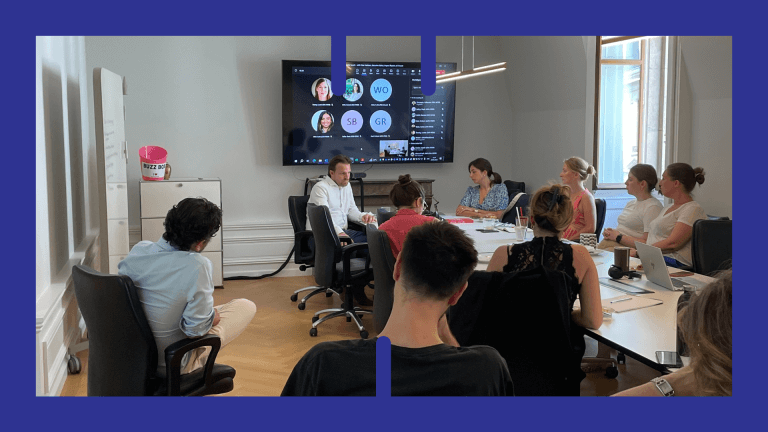Exploring ESG with Fortune's Executive Editor: Insights from Weber Shandwick's Conversation in Switzerland
- Weber Shandwick Geneva hosted a conversation with Peter Vanham, Executive Editor at Fortune, focusing on the evolving corporate ESG agenda and stakeholder capitalism.
- As Executive Editor at Fortune, Peter oversees Fortune Connect and writes “The Impact Report,” a newsletter for Chief Sustainability officers and ESG professionals.
- Peter shared insights on the importance of impact assessment, the challenges of greenwashing, and the role of stakeholder engagement in shaping the corporate agenda.
Weber Shandwick Switzerland hosted a conversation with Peter Vanham, focusing on the evolving corporate ESG agenda and stakeholder capitalism.
As Executive Editor at Fortune, Peter oversees Fortune Connect, the global learning community for next generation leaders focused on purpose-driven leadership, sustainability, stakeholder capitalism and DEI. He also writes “The Impact Report”, a newsletter for Chief Sustainability officers and ESG professionals.
Peter is a former communications executive at the World Economic Forum and co-author of the book Stakeholder Capitalism: A Global Economy that Works for Progress, People and Planet.
Here is an excerpt from Peter’s interview with Katherine Docampo, Senior Vice President of Leadership and Impact Communications at Weber Shandwick.
Q: Tell us the story of Impact Report. Why did Fortune bring you on to create it? What stories do you focus on?
PV: The idea for the Impact Report stemmed from the realization that ESG (Environmental, Social, and Governance) was a term that had become polarizing across the political spectrum. Fortune, being a business title that doesn’t take political sides, sought a more inclusive approach. The concept of “impact” resonated with me, as it reflects the broader significance and influence of companies beyond financial metrics. Over the past year, I’ve explored and highlighted the different ways in which businesses make an impact, covering a wide range of topics.
Q: In a recent column, you mentioned that “ESG is dead.” Can you explain this statement and its implications in the US context?
PV: Declaring something dead is not my intention, but as a journalist, I strive to report the truth rather than my personal preferences. In the US, ESG has become an untouchable term, associated with political camps. The column’s title, “ESG is Dead, Long Live E, S, and G,” alludes to the idea that the acronym itself may be polarizing, but the underlying commitments to environmental, social, and governance issues persist. Companies and individuals working on sustainability and impact are still actively pursuing their objectives, even if the term ESG has taken on conflicting connotations.
Q: Greenwashing has become a common accusation, especially in the context of COP 28. How do you handle stories that may involve greenwashing? How do you make assessments in such cases?
PV: I give priority to assessing the impact and honesty of companies’ earnings. I focus on Fortune 500 companies and their associations with reputable organisations or major investors for reasons of credibility. I assume the honesty of specific ESG measures but remain sceptical about the narratives surrounding them. Genuine commitment and proof of real impact are essential in the fight against greenwashing.
Q: Stakeholder engagement and mapping have become strategic values in the communications world. How have you seen this play out authentically, and how do you distinguish it from mere greenwashing?
PV: Stakeholder engagement is vital for companies seeking to navigate complex societal issues. While some companies genuinely include stakeholders in decision-making processes, others engage in superficial efforts that resemble greenwashing. Many companies recognise the need to strengthen stakeholder engagement, both formally and informally. This can involve technical processes such as stakeholder mapping and materiality matrices, as well as qualitative conversations with stakeholders. The authentic engagement of stakeholders is becoming increasingly important in the corporate world.
Q: How do you see the future of the impact report and its role in shaping the corporate agenda?
PV: The Impact Report will continue to evolve and adapt to the changing business landscape. It will remain a platform for exploring and showcasing the impact that companies have beyond financial performance. By highlighting stories of innovative solutions, sustainable practices, and social contributions, the report aims to inspire and inform leaders about the possibilities and responsibilities they have in shaping a more inclusive and sustainable future.
Q: You wrote a defining book on stakeholder capitalism. Can you tell us more about it and why you wrote it in 2021?
PV: Stakeholder theory, championed by Klaus Schwab, Founder and Chairman of the World Economic Forum, has been ingrained in German economic policies for decades. The German approach recognizes the importance of business, government, and civil society collaborating for a country’s development. In my book, I explored the origins of stakeholder capitalism by studying Schwab’s life story and the post-war reconstruction efforts that shaped his perspective. I wrote the book in 2021 because the dominant economic model, characterized by shareholder primacy, has led to social and economic crises. In a time of multiple crises, adopting a stakeholder approach offers an alternative to short-term profit focus and aims for broader societal impact.

Acknowledgment:
We would like to thank Peter Vanham for taking the time to share his thoughts and ideas on impact reporting and the changing landscape of corporate social responsibility. His expertise enriched our understanding of ESG trends and their implications for our role as communications professionals and for our clients
